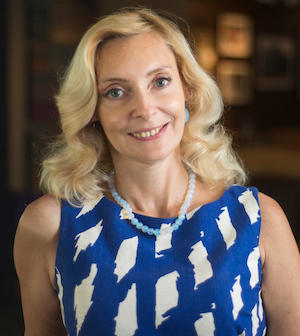In This Story

The ongoing war in Ukraine is unique from other conflicts, and the international community can take five actions to control the situation, said Karina Korostelina, professor and director of the Program for the Prevention of Mass Violence at George Mason University’s Carter School for Peace and Conflict Resolution.
Korostelina shared her perspective over Zoom:
What makes this war different?
This is not a war between people—it’s completely orchestrated by [Russian President Vladimir] Putin and his close supporters who made decisions about invasion through a groupthink process that prioritizes selected information, cuts off other sources, and silences people who are afraid to raise their voice because they’ll be ousted or persecuted.
The invasion also was backed by a very strong media propaganda and information war, as they try to convince their population that Ukrainian people are hateful and aggressive, that they prosecute Russians and support Nazis. This has been going on for multiple years to justify Putin [invading] Ukraine and now is a part of the nested model of war. But the conflict is not rooted in negative relations between Russian and Ukrainian people.
Where did Putin’s narrative come from?
Calling Ukrainians Nazis is completely irrelevant, because, for example, the president of Ukraine is Jewish. Every country has nationalist groups, and this one is such a small percentage of the population, which should not be taken into account. Putin is using this to justify his actions to his own people.
Russian forces invaded Georgia in 2008, annexed Crimea in 2014, and the lack of serious consequences for Putin’s actions encouraged continued acts of aggression, such as those we see today, Korostelina said.
What could have been done to prevent escalation?
The president of Ukraine called for preemptive actions, but unfortunately our administration in the United States and the European Union were very reluctant to outline specific sets of sanctions. Now they are establishing sanctions, but it’s too late because so many people already died. Cities are destroyed.
There is also no representative of the United Nations in Ukraine right now. It took six days and devastation of civilians in such cities as Kharkiv and Volnovakha for international organizations to step in and organize humanitarian support. However, several cities, including Kherson, did not receive “green corridor.” We have to save civilians.
For me, this war brings up a question we really need to discuss: What is the responsibility of the United Nations and other organizations, which could not prevent war and could not immediately provide support during a humanitarian crisis?
What needs to be done now?
- Sanctions are key for cutting off the financial support of the war and for reducing support for Putin among the Russian population.
- Putin is using tactics of civilian devastation to intimidate the Ukrainian government and the West. The continuous support for safe “green corridors” and the creation of a “no fly” zone over Ukraine is essential for protecting civilians.
- I believe in stopping visas and stripping citizenship from all Russian oligarchs who live in England, France, and other places, who are still giving money to this war or supporting Putin.
- Putting pressure on Putin. It is great that the International Criminal Court opened investigation for civilian devastation. It’s a mandate to prosecute individuals for war crimes.
- We need to give Russian people the opportunity to realize, not only by sanctions, but also through information given to them, what Putin is actually doing and that he is a war criminal. A strong response to Putin’s information war is essential for increasing pressure from inside.
You’ve researched resiliency in conflict. What do you see as contributing to Ukrainians’ resiliency?
One of the key components for resilience of Ukrainian society during the regional armed conflict in Eastern Ukraine, which we also see now, was volunteering. Right now, everyone is stepping in, in very creative ways. People are using bottles to create weapons, others are calling every Russian phone number they can find to tell them what is actually happening, other people are medical volunteers, and others are buying food to feed displaced people. Everybody is involved in some creative way, and that is very important.
How has the Carter School played a role in Ukraine?
We've done a lot of work in Ukraine. One project was Dialogue and Difference, supported by the U.S. State Department, which involved teaching students and children how to be engaged in dialogue for resolution of conflicts.
Another ongoing project, also supported by the State Department, involves teaching students conflict resolution skills for dealing with issues in society and creating internships for local administrations and NGOs.
The third project was with the German Civil Peace Service in training history teachers in Ukraine how to teach about peace, different forms of violence, and how to address multiple controversial issues in Ukraine, including armed conflict in the East. There is such a big need for understanding and dealing with issues of peace and violence that we are providing. Mason is deeply involved in work with the Ukrainian community, and we will continue doing this work.
